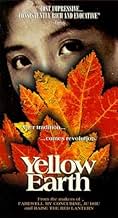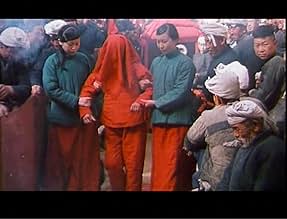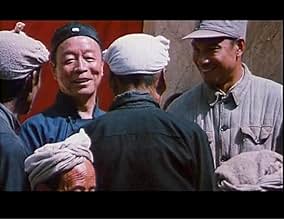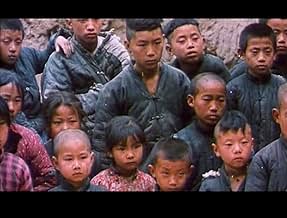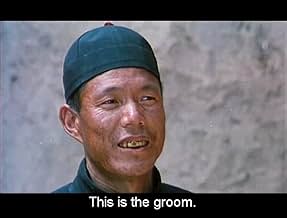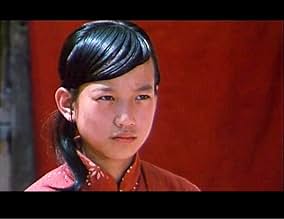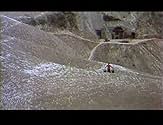VALUTAZIONE IMDb
7,1/10
2670
LA TUA VALUTAZIONE
Aggiungi una trama nella tua linguaA communist soldier travels to Shanbei to collect folk songs for propaganda while visiting a poor peasant family, giving hope to the teenage daughter in escaping an arranged marriage.A communist soldier travels to Shanbei to collect folk songs for propaganda while visiting a poor peasant family, giving hope to the teenage daughter in escaping an arranged marriage.A communist soldier travels to Shanbei to collect folk songs for propaganda while visiting a poor peasant family, giving hope to the teenage daughter in escaping an arranged marriage.
- Regia
- Sceneggiatura
- Star
- Premi
- 8 vittorie e 5 candidature totali
Recensioni in evidenza
Not far from the yellow river there is a big area where the earth also is yellow and the climate and living are very harsh, this time because of a drought. First we see a wedding ceremony with the bride little more than 12 years old, a happy occasion for everyone except for the skeptical onlooking Cuiqiao whose fate will be similar in short time and the bride herself. Enter folk song collector comrade Gu who stays with her family for some time. His talk of whats going on in the south, the end of arranged weddings and equality of women sets a deep impression on Cuiqiao, but also her mute brother.
Much of the film is told in its folk songs and its pictures. Cuiqiaos misery is told with songs: "of all the people//girls are the most miserable" and her new hope with the songs of the Party.
The pictures leave much room for the environments to sink in. Distances are big and the landscape homogeneous, that is earth covered mountains and a wide yellow river. In a setting such as this, the figures get small, and even more so by the devotion Zhang Yimou gives to the vast sky.
Much of the film is told in its folk songs and its pictures. Cuiqiaos misery is told with songs: "of all the people//girls are the most miserable" and her new hope with the songs of the Party.
The pictures leave much room for the environments to sink in. Distances are big and the landscape homogeneous, that is earth covered mountains and a wide yellow river. In a setting such as this, the figures get small, and even more so by the devotion Zhang Yimou gives to the vast sky.
Yellow Earth is a classic film, which reflects that the situation of peasant's life is in yellow earth. At the beginning of the film, with a folk, the screen shows audience the background of this movie, which is a soldier came to yellow earth for collecting folk. With the development of story, the viewer can find that the situation of local environment is poor and austere, their thought is conservative and antiquated, and local people is humane and ignorance. However, through the soldier's describing, you can make comparison between yellow earth and the South in thought, education and so on. Although these traditional rules and culture were the same before many years ago, with the development and changing of society, China was changing. However, local people still live in the primitive China, their life is poor, cannot get education and keep the old traditional custom.
In Yellow Earth, there are some details reflecting thought of Confucian. The girls must obey parents' order and have matchmaker making match, which is the traditional thought for marriage. For example, when the soldier told them that girls can own choose husband and marriage by themselves in South now and people claim loving in freedom, Cui Qiao's father cannot accept this thought. He still thinks that daughter's marriage need traditional rules. If not, he thinks that it is not good for the girl. It not only reflects that thought of Confucian, but also shows that local people' thought is antiquated, adamant and old- fashioned. In the film, although Cui Qiao's father knows that Cui Qiao is not willing to marriage, he cannot change mind and persuade Cui Qiao agree. Except for this, When the soldier asks Cui Qiao's father about his daughter's marriage, the man told him that couple do not need premarital feeling, which means they do not need love each other. This action and thought is like in the antiquity. At the antiquity, girls do not know who will be her husband and what his appearance is. And Cui Qiao's father says this marriage was confirmed when Cui Qiao was a child, which is another traditional culture.
Second, in the film, it reflects that the position of women is low and the position between man and woman is not the balance. Girls cannot choose husband and have liberal love. Except for this, generally, the man can be older than girl and the differential of age is big. Like Cui Qiao and her husband. The reason why Cui Qiao will marry with her husband is when she was a child, her home is poor, and, for his brother, her father agree this marriage. In the local place, it is the common phenomenon. However, this kind of marriage is cruel and cannot be accept for girls. In the film, the bride does not have smile including not only Cui Qiao but also the bride is at the beginning of the film. For marriage, girls are not satisfied but they have to accept for their family and themselves. At yellow earth, girls have only one way that is marriage. However, only one way is that they cannot decide and choose by themselves, which is dolorous.
Third, it is conflicted for local people to see yellow earth. In the film, a shot is Cui Qiao' father stand on yellow earth, he looks at sky and feel helpless, sad, because there is no rain for a long time. He told the soldier that no one want to farm in yellow earth because this sod is not suitable to farm, but they cannot give up yellow earth because they depend on this sod to live. This is a conflicted emotion. Local people know the problem of sod but they think this sod feed them, so they cannot give up yellow earth. And, Cui Qiao has the same conflicted emotion. She cannot accept her marriage but she cannot oppose for her brother and father, which reflects that she is a humane and dutiful daughter.
Except for these, through film, I find that local people have not good education at that place, so it causes that they are unknown and thought is antiquated. When the soldier wants to write a couplet, Cui Qiao refuses him because no one knows words. They cannot get education, it caused that their thought is antiquated and do not want to know new information and rules. They still keep to tradition. And in the film, there a lot of time having no dialogue. Local people are silence. They do not talk with others, only when they meet difficulty, they can sing a folk to say about the difficulty of their life. At the end of film, Cui Qiao wants to change her life, she try her best to find the new way. She wants to get freedom. So, she leaves her home, cut her hair and find to the Red Army by herself. It means the girl aspire to freedom.
Thus, I think that this film – Yellow earth is good film. It lets the viewer know that farmers' life in yellow earth at that time and a traditional custom.
In Yellow Earth, there are some details reflecting thought of Confucian. The girls must obey parents' order and have matchmaker making match, which is the traditional thought for marriage. For example, when the soldier told them that girls can own choose husband and marriage by themselves in South now and people claim loving in freedom, Cui Qiao's father cannot accept this thought. He still thinks that daughter's marriage need traditional rules. If not, he thinks that it is not good for the girl. It not only reflects that thought of Confucian, but also shows that local people' thought is antiquated, adamant and old- fashioned. In the film, although Cui Qiao's father knows that Cui Qiao is not willing to marriage, he cannot change mind and persuade Cui Qiao agree. Except for this, When the soldier asks Cui Qiao's father about his daughter's marriage, the man told him that couple do not need premarital feeling, which means they do not need love each other. This action and thought is like in the antiquity. At the antiquity, girls do not know who will be her husband and what his appearance is. And Cui Qiao's father says this marriage was confirmed when Cui Qiao was a child, which is another traditional culture.
Second, in the film, it reflects that the position of women is low and the position between man and woman is not the balance. Girls cannot choose husband and have liberal love. Except for this, generally, the man can be older than girl and the differential of age is big. Like Cui Qiao and her husband. The reason why Cui Qiao will marry with her husband is when she was a child, her home is poor, and, for his brother, her father agree this marriage. In the local place, it is the common phenomenon. However, this kind of marriage is cruel and cannot be accept for girls. In the film, the bride does not have smile including not only Cui Qiao but also the bride is at the beginning of the film. For marriage, girls are not satisfied but they have to accept for their family and themselves. At yellow earth, girls have only one way that is marriage. However, only one way is that they cannot decide and choose by themselves, which is dolorous.
Third, it is conflicted for local people to see yellow earth. In the film, a shot is Cui Qiao' father stand on yellow earth, he looks at sky and feel helpless, sad, because there is no rain for a long time. He told the soldier that no one want to farm in yellow earth because this sod is not suitable to farm, but they cannot give up yellow earth because they depend on this sod to live. This is a conflicted emotion. Local people know the problem of sod but they think this sod feed them, so they cannot give up yellow earth. And, Cui Qiao has the same conflicted emotion. She cannot accept her marriage but she cannot oppose for her brother and father, which reflects that she is a humane and dutiful daughter.
Except for these, through film, I find that local people have not good education at that place, so it causes that they are unknown and thought is antiquated. When the soldier wants to write a couplet, Cui Qiao refuses him because no one knows words. They cannot get education, it caused that their thought is antiquated and do not want to know new information and rules. They still keep to tradition. And in the film, there a lot of time having no dialogue. Local people are silence. They do not talk with others, only when they meet difficulty, they can sing a folk to say about the difficulty of their life. At the end of film, Cui Qiao wants to change her life, she try her best to find the new way. She wants to get freedom. So, she leaves her home, cut her hair and find to the Red Army by herself. It means the girl aspire to freedom.
Thus, I think that this film – Yellow earth is good film. It lets the viewer know that farmers' life in yellow earth at that time and a traditional custom.
A young slodier from the communist party is sent to northern China to collect some "happy" fols songs for helping the party boost army's morale during the battle against Japanese invasion in 1939 shortly before WW2. There he meets a farmer family- a father and 2 kids- but all songs they know is about endless suffering and pain.
Director Kaige Chen uses this setting to build up a rather interesting encounter between 1. a young soldier full of ideologies and strong beliefs and 2. a poor family in rural north China with extreme living difficulties and hardships. The young soldier believes that sickles and hammers will help these poor people and build them roads but we as viewers know that such things won't happen, we've seen that no ideology will end these circumstances.
The film is believed to be a Chinese communist propaganda vessel but what I gathered from this film was that it shows communism- maybe not directly- as yet another incompetent, useless set of beliefs.
This is not an enjoyable film, nor is it easy to watch. It feels really long for 86 minutes and it desparately needs a restoration. What it does however, is it opens discussions with friends, it makes people think and of course it's a very influential, historically important cinematic piece.
Director Kaige Chen uses this setting to build up a rather interesting encounter between 1. a young soldier full of ideologies and strong beliefs and 2. a poor family in rural north China with extreme living difficulties and hardships. The young soldier believes that sickles and hammers will help these poor people and build them roads but we as viewers know that such things won't happen, we've seen that no ideology will end these circumstances.
The film is believed to be a Chinese communist propaganda vessel but what I gathered from this film was that it shows communism- maybe not directly- as yet another incompetent, useless set of beliefs.
This is not an enjoyable film, nor is it easy to watch. It feels really long for 86 minutes and it desparately needs a restoration. What it does however, is it opens discussions with friends, it makes people think and of course it's a very influential, historically important cinematic piece.
Yellow Earth by Chen Kai-ge (Farewell My Concubine, Life on a String) was the first film of the so-called fifth generation of filmmakers who introduced a new aesthetic and social awareness to Chinese cinema. It is set just before World War II in Shaanxi province in Northern China near the Yellow River, an area referred to as gian shan wan he (thousands of hills and ten folds more gullies). Based on Ke Lai's novel, "Echo in the Deep Valley", the film shows the struggle of the peasants in the area known for its unyielding harshness and the folk traditions they drew on to express their anguish. As the film begins, cinematographer Zhang Yimou creates a feeling of desolation with panoramic shots of the vast landscape as a soldier from the Communist Eighth Route Army, Gu Qing (Wang Xueyin), walks over the barren hills to a small village. He says he is there to collect folk songs for the army to use so that "the people will know why they are suffering, why their women are beaten, and why they should rise up".
Comrade Gu stays with a poor family that includes 47-year old widowed father (Tan Tuo), his 13-year old daughter Cuiqiao (Xue Bai), and almost mute son Hanhan (Liu Quiang). Rather than relying on traditional narrative to convey the film's message, Kai ge uses long static shots and songs of the people to express mood and tone. The father has become embittered with his life of constant deprivation and sings "Life is hard for seasonal workers. They are hired in January, dismissed in October". Conditions are tough and the farmers pray for rain to alleviate the drought but there is no rain. At a wedding, the serving of wooden fish figures covered with sauce underscores the lack of adequate food. The film also dramatizes the sorry condition of women, showing how they had to carry heavy buckets of water on their backs for miles, and how they were forced into arranged marriages at a very young age.
Gu is seemingly confident of the fight he is waging. He lets the family know that in the South, there are no longer any arranged marriages and tells Cuiqiao about women who cut their hair, fight against the Japanese, and can read and write. She hears about her older sister's unhappy marriage and does not want to endure the same fate. "Of all us poor folk," she sings, "girls are the saddest." Cuiqiao is infatuated with Gu and wants to leave home and join the Army 200 miles away in Yanan. She knows that if she stays she will be forced to marry an older man in an arranged ceremony. When Gu leaves to return to camp, he promises to return in April. Promises alone, however, cannot change Cuiqiao's growing feeling of entrapment or the terrible consequences that follow. In its heartbreaking portrayal of people caught in lives of "quiet desperation" that even Communist ideas or marching songs cannot redeem, Yellow Earth speaks a universal language.
Comrade Gu stays with a poor family that includes 47-year old widowed father (Tan Tuo), his 13-year old daughter Cuiqiao (Xue Bai), and almost mute son Hanhan (Liu Quiang). Rather than relying on traditional narrative to convey the film's message, Kai ge uses long static shots and songs of the people to express mood and tone. The father has become embittered with his life of constant deprivation and sings "Life is hard for seasonal workers. They are hired in January, dismissed in October". Conditions are tough and the farmers pray for rain to alleviate the drought but there is no rain. At a wedding, the serving of wooden fish figures covered with sauce underscores the lack of adequate food. The film also dramatizes the sorry condition of women, showing how they had to carry heavy buckets of water on their backs for miles, and how they were forced into arranged marriages at a very young age.
Gu is seemingly confident of the fight he is waging. He lets the family know that in the South, there are no longer any arranged marriages and tells Cuiqiao about women who cut their hair, fight against the Japanese, and can read and write. She hears about her older sister's unhappy marriage and does not want to endure the same fate. "Of all us poor folk," she sings, "girls are the saddest." Cuiqiao is infatuated with Gu and wants to leave home and join the Army 200 miles away in Yanan. She knows that if she stays she will be forced to marry an older man in an arranged ceremony. When Gu leaves to return to camp, he promises to return in April. Promises alone, however, cannot change Cuiqiao's growing feeling of entrapment or the terrible consequences that follow. In its heartbreaking portrayal of people caught in lives of "quiet desperation" that even Communist ideas or marching songs cannot redeem, Yellow Earth speaks a universal language.
10zzmale
including the communist ideology.
Great directorial work in describing the harsh conditions that not only resulted from unforgiving nature and political turmoil, but also from the burden of traditional Chinese culture, which is partly to blame for the political turmoils of post-revolution era. The film is one of the pioneers in the re examination of Chinese tradition and although it has not gone into detailed criticism like later films such as Bian Lian (Change Face) of later era, it was a good beginning.
Great directorial work in describing the harsh conditions that not only resulted from unforgiving nature and political turmoil, but also from the burden of traditional Chinese culture, which is partly to blame for the political turmoils of post-revolution era. The film is one of the pioneers in the re examination of Chinese tradition and although it has not gone into detailed criticism like later films such as Bian Lian (Change Face) of later era, it was a good beginning.
Lo sapevi?
- QuizThe film was filmed near Yan'An, which is considered the motherland of the Chinese cultural revolution.
- ConnessioniFeatured in Storia del cinema: Un'odissea: Fight the Power: Protest in Film (2011)
I più visti
Accedi per valutare e creare un elenco di titoli salvati per ottenere consigli personalizzati
- How long is Yellow Earth?Powered by Alexa
Dettagli
Contribuisci a questa pagina
Suggerisci una modifica o aggiungi i contenuti mancanti

Divario superiore
By what name was Huang tu di (1984) officially released in India in English?
Rispondi
